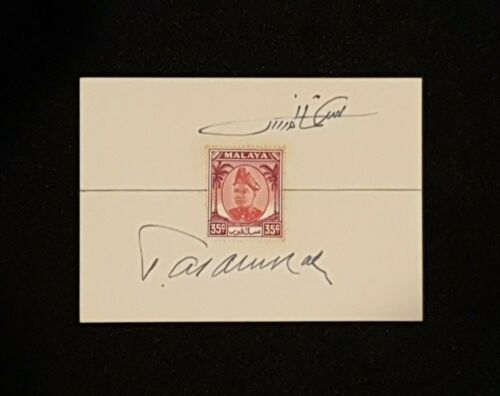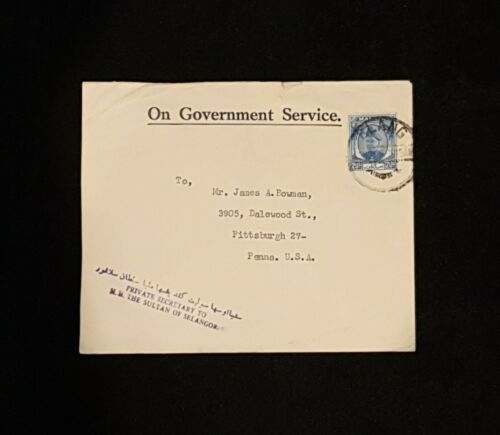-40%
Rare Sultan Selangor King Malaysia Signed Royal Document Autograph Postal Stamp
$ 448.77
- Description
- Size Guide
Description
For your consideration is an exceedingly rare and important hand-signed manuscript autograph/ signature of Sultan Sir Hisamuddin Alam Shah Al-Haj Ibni Almarhum Sultan Alaeddin Sulaiman Shah on card with original postal / postage stamp. Beautiful signature. Condition is original. Hand-signed in ink. Guaranteed original and authentic.Autographed piece of cardstock signed by Sultan Sir Hisamuddin Alam Shah Al-Haj Ibni Almarhum Sultan Alaeddin Sulaiman Shah KCMG (May 1898 – 1 September 1960) who was the second Yang di-Pertuan Agong of Malaya from 14 April to 1 September 1960, and the sixth Sultan of Selangor between 1938–1942 and again from 1945–1960.
The signature is over a related stamp: Malaya Sengalor 35c Sultan Hisam-ud-Din Alam Shah Scott 100. Also included: Sultan letter and cover with handstamp "Private Secretary to H.H. The Sultan of Selangor" from Malaya Selangor to Bowman in Pittsburgh PA.
Sultan Sir Hisamuddin Alam Shah Al-Haj Ibni Almarhum Sultan Alaeddin Sulaiman Shah KCMG (Jawi: سلطان حسام الدين عالم شاه الحاج ابن المرحوم سلطان علاء الدين سليمان شاه; 13 May 1898 – 1 September 1960) was the second Yang di-Pertuan Agong of Malaya from 14 April to 1 September 1960, and the sixth Sultan of Selangor between 1938–1942 and again from 1945–1960.
He was the third son of Sultan Alauddin Sulaiman Shah ibni Raja Muda Musa (1863–1938) by Cik Puan Hasnah binti Pilong, a commoner wife. Named Tengku Alam Shah at birth, he was not expected to succeed as he had two elder half-brothers.
Educated at the Malay College Kuala Kangsar, he was instrumental in the establishment of the Malay College Old Boys Association (MCOBA) in 1929. In 1931, he was appointed Tengku Laksamana of Selangor, having previously served as Tengku Panglima Raja.
Sultan Alaeddin Sulaiman Shah had many children, his first three sons in chronological order being Tengku Musa Eddin, Tengku Badar Shah and Tengku Alam Shah. The first two sons were children by his royal consort, Tengku Ampuan Maharum binti Tengku Dhiauddin of the royal house of Kedah. In 1903, Tunku Musa Eddin had been made Tengku Mahkota and was promoted to Raja Muda or heir apparent in 1920.
However, at the instigation of the British Resident, Theodore Samuel Adams (1885–1961; in office 1935 – 1937), Tengku Musa Eddin was dismissed as Raja Muda in 1934 for alleged "misbehaviour". Adams had accused Tengku Musa Eddin as a spendthrift and wastrel with a penchant for gambling. However, many Malays in Selangor believed the real reason for Tengku Musa Eddin's dismissal was his refusal to follow Adam's orders.
Although Sultan Sulaiman pleaded for the case of Tengku Musa Eddin (even petitioning the Secretary of State for the Colonies and discussing the issue directly with him in London), Tengku Alam Shah was instead proclaimed Raja Muda or heir to the throne over the head of his other half-brother Tengku Badar. The appointment occurred on 20 July 1936.
Tengku Alam Shah was proclaimed Sultan on 4 April 1938, four days after the death of his father. On 26 January 1939, he was crowned at Istana Mahkota Puri in Klang. Tengku Musa Eddin, then Tengku Kelana Jaya Putera, presided over the ceremony.
The return of the British finally brought Sultan Hisamuddin Alam Shah back to the throne, while ex-Sultan Musa was exiled to the Cocos Keeling Islands. Although he had signed the Malayan Union treaty, like all other Malay rulers, he later repudiated it and gave open support to Malay nationalist effort to overthrow the plan.
On 1 March 1946, Sultan Alam Shah officiated the First Malay Unity Congress at the Sultan Sulaiman Club in Kuala Lumpur which was instrumental in creating UMNO. The Congress was organised by the Selangor Malay Society (PMS) which had as its president the scholar Zainal Abidin Ahmad (Za'ba), a critic of British colonial rule.




















